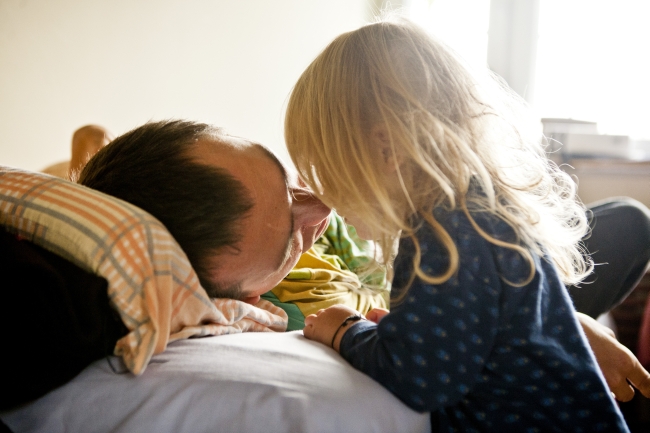

How many kids are running away when they see Kuba? How many are afraid? And why my girls’ favourite game is to slide down from his knees to the footrest of his wheelchair?
Kuba is my older brother. Born in 80s in Poland, due to the mistake of the doctors, he stayed too long in our mama’s belly and was born with cerebral palsy. He has disable hands, legs, he speaks with difficulties, he needs help with every physical part of his life. And he is probably the most loved brother in this planet. And for sure, the most beloved uncle for my girls.
Since 30 years I was a witness of those situations: Kuba on his wheelchair is crossing the city, and the kids are running away, pointing him with fingers, laughing. As a little girl I was really fighting with it (once I even have beaten someone!). As a bigger girl I tried to talk with others. I know it is not an easy situation to meet a disable person for the first time. Theoretically I know, because since always our house was full of his friends, in my childhood I spend a lot of time in his kindergarten, school or on dancing competitions (yes, he was a wheel-chair dancer, yes, he had 3rd place in Europe in some point). But what to do to make it easier?
I have never really needed to talk with my girls about Kuba. For them it’s clear that some people speak Polish, some speak German, some have black skin and some cannot walk. But in the moment Hanna asked me before the breakfast if it can be her feeding today Kuba – was a moment I realised how a good example can change things. I have never asked the girls to help Kuba with anything. I have never forced them to hug or kiss him. And you know what was one of the first thing that Mila did when she was able to hold a glass of water in her small hands? She went to him and asked: Kuba, drink?
My girls’ favourite game when we are in Warsaw is sliding down from Kuba’s knees to the footrest of his wheelchair. They climb on his legs and then have fun with falling down. I guess I don’t have to tell you how happy he is to play with them.
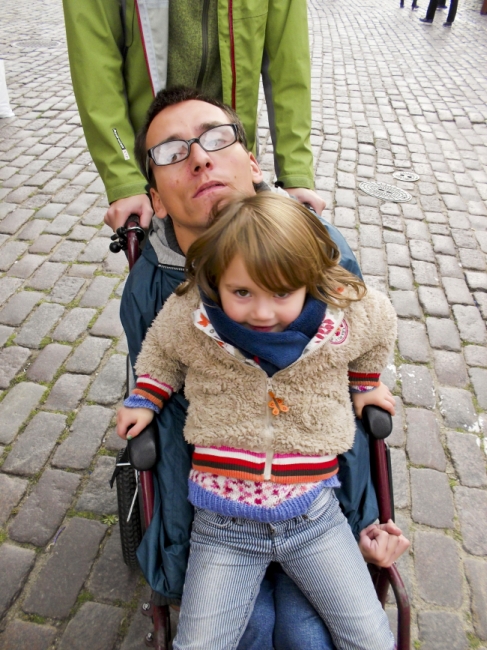
Even if Kuba doesn’t speak clearly (he has strong articulatory dysfunction), one can understand him. The one, who is willing to. The girls do. They would never ignore him calling or asking for anything. Even when they were still not speaking, they would come to me to another room, take my hand and lead me to him, because he was calling and I didn’t hear that. The pride of mama is exploding in those moments. Trying to help him with dressing up, cleaning the nose, eating, drinking, driving the wheelchair – they do it all, just because.
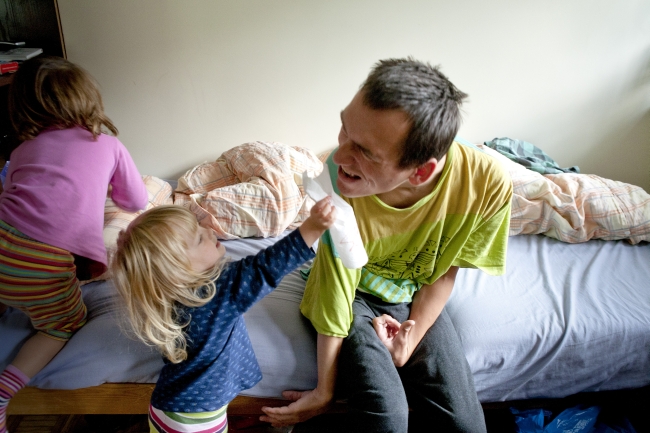
Last time in Warsaw I organised a party for Kuba (after many many years of fighting we managed to get a rampa to the building, so there is no need to pull the wheelchair on the stairs anymore when the elevator is broken). Everybody was happy and excited. And you know with what Hanna was the most excited? There was one friend of Kuba, Lukas, using a big table with the alphabet as a facilitated communication tool. Hanna already know some letters and can read a bit, so Lukas was showing with his nose the letters – and she was trying to read. – Mummy, what a smart guy he is!! – she told me later.
Few days ago in Berlin we met a girl on the wheelchair. Maybe 20-year-old, walking in the park with grandmother. My girls run to her, gave her hands and were trying to pull her with the wheelchair between them. Saying: hello and what is your name. – Never, ever, any kid was playing with her – said the grandma. The girl had tears in her eyes and couldn’t say a word.
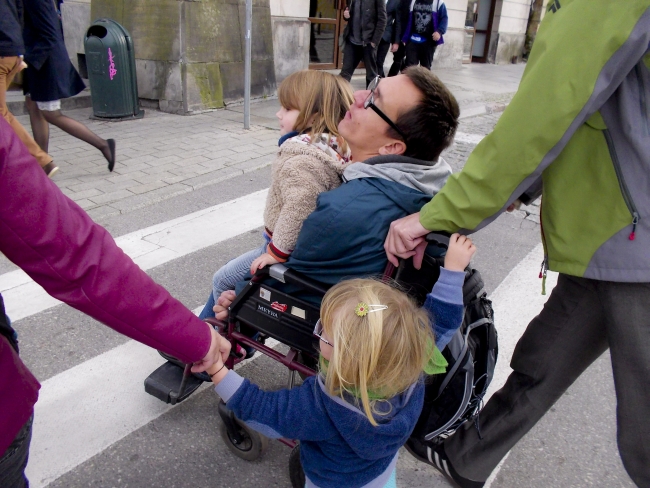
Dear readers. I’m not writing it to show off and tell you how cool kids I have (even if I have!;). Just wanted to tell you that I do believe that meeting a diversity is very very important for your kids. Go together on the sport championships for disable kids, go to another church, watch a favourite cartoon in another language, The faster – the better. Because at the beginning it just… comes naturally.
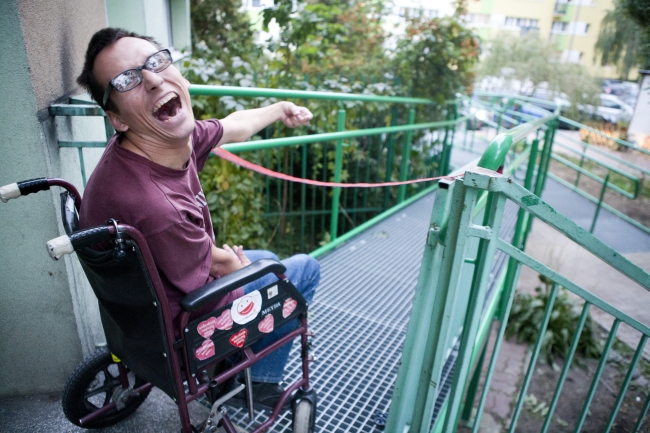
This post is also available in: Polish
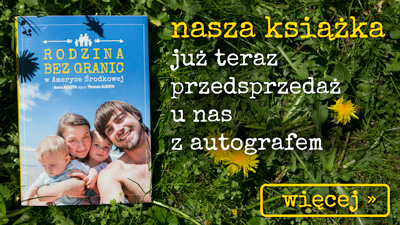
Our first book is out!
We have published our first book (for now just in Polish:) about our Central America Trip.
See, read and order here »
16 Comments
Ogromnie wzruszające … łzy mi lecą i zastanawiam się ile jest takich rodzin jak Wasza? W tym nieustannym szale, pędzie, chaosie emocjonalnym jaki fundujemy naszym dzieciom dzisiaj Wy płyniecie z zupelnie innym prądem. Jestem pełna podziwu i uwielbienia dla Was.
Myślę, że mnóstwo jest nie-pędzących rodzin, nie wszystkie tylko mają blogi :) Dziękujemy za miłe słowa!
piękny post. i zgadzam sie w 100% im szybciej pokazemy dziecią ,ze róznice lączą a nie dzielą bedzie wiecej fajnych ludzi na świecie :)
Niech będzie!
Thank you for sharing your brother’s story with us. I got teary reading this post. God has blessed you with a special family. Our kids are being raised to be the same way. Diversity is wonderful. God bless you and your husband and your sweet little ones.
Thank you!
Aniu, bardzo fajny pościk. Świetne masz dzieciaki, ale pewnie spora w tym zasługa sposobu w jaki je wychowujesz. Gdyby wszyscy rodzice w taki jak ty sposób wychowywali swoje dzieci, pewnie nie było by takiego wykluczenia społecznego osób o innym kolorze skóry, posiadających jakąś niepełnosprawność czy wychowanych w takiej a nie innej religii czy światopoglądzie, itd.. Ja na razie nie mam dzieci, ale jak słysze czasem co matki opowiadają swoim pociechom, to włos jeży mi się na głowie. “Jak będziesz niegrzeczny/a to Cię porwie jakiś arab albo cygan”, że np. ktoś niepełnosprawny to “biedne, pokrzywdzone przez los dziecko” a nie np. “fajny kumpel, z którym mogę dzielić jakieś wspólne pasje”. To wszystko bierze się chyba z jakiegoś lęku indukowanego przez rodziców, oraz ich ignorancji. Ale na szczęscie coraz więcej widzi się par, które są jak ty i Tom. Gratulacje!
I read this work while on a break at work and started crying. This is so emotionally moving. I also have a disabled brother- autistic- and in my family the way to deal with the situation was to ignore it and pretend that everything is fine. And now that he is older he is completly isolated from society other than my parents.
This makes everyone realise that there is a way to fight discrimination- and that comes from teaching your children early about how to treat all people. I am so happy that you are doing this, and writing about it- sharing your personal story that needs so much to be heard!
you and your family as such an inspiration! keep doing what you’re doing!
Pieknie napisane. Nic dodac, nic ujac.
Pozdrawiam!
This is one of the best and one of the most important posts on your blog. I’m very touched… more than I could possibly say. Thank you all!
Fantastyczny tekst! Dzięki:) Uściski dla dziewczyn i Kuby!
Anuś, a mówiłam Ci, że Cię kocham i jestem z Ciebie bardzo dumna?
That all is so important for me! Thank you!
i co za przystojny brat!!!
Pięknie napisane. Wzruszyłam się. Gratuluję, że uczycie swoje dzieci takiej postawy. Oby więcej takich rodziców. Niesamowite, że dla dzieci nie istnieją żadne podziały. Dopiero my dorośli uczymy ich tego, a ich świat bez uprzedzeń zaczyna się wtedy burzyć.